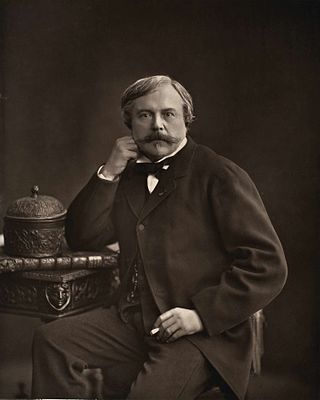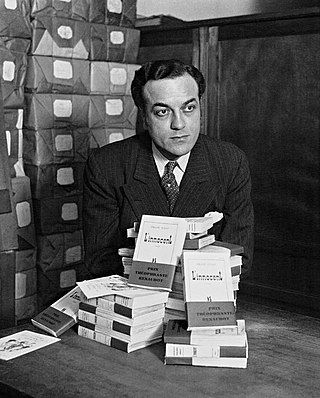
The Prix Goncourt is a prize in French literature, given by the académie Goncourt to the author of "the best and most imaginative prose work of the year". The prize carries a symbolic reward of only 10 euros, but results in considerable recognition and book sales for the winning author. Four other prizes are also awarded: prix Goncourt du Premier Roman, prix Goncourt de la Nouvelle, prix Goncourt de la Poésie (poetry) and prix Goncourt de la Biographie (biography). Of the "big six" French literary awards, the Prix Goncourt is the best known and most prestigious. The other major literary prizes include the Grand Prix du roman de l'Académie française, the Prix Femina, the Prix Renaudot, the Prix Interallié and the Prix Médicis.

Edmond Louis Antoine Huot de Goncourt was a French writer, literary critic, art critic, book publisher and the founder of the Académie Goncourt.

The Prix de Rome or Grand Prix de Rome was a French scholarship for arts students, initially for painters and sculptors, that was established in 1663 during the reign of Louis XIV of France. Winners were awarded a bursary that allowed them to stay in Rome for three to five years at the expense of the state. The prize was extended to architecture in 1720, music in 1803 and engraving in 1804. The prestigious award was abolished in 1968 by André Malraux, then Minister of Culture, following the May 68 riots that called for cultural change.
French literature generally speaking, is literature written in the French language, particularly by citizens of France; it may also refer to literature written by people living in France who speak traditional languages of France other than French. Literature written in the French language by citizens of other nations such as Belgium, Switzerland, Canada, Senegal, Tunisia, Algeria, Morocco, etc. is referred to as Francophone literature.

Pascal Quignard is a French writer born in Verneuil-sur-Avre, Eure. In 2002 his novel Les Ombres errantes won the Prix Goncourt, France's top literary prize. Terrasse à Rome, received the French Academy prize in 2000. In 1980 Carus had been awarded the "Prix des Critiques". He also won the 2023 Formentor Prize for Letters.

Alexandre Cabanel was a French painter. He painted historical, classical and religious subjects in the academic style. He was also well known as a portrait painter. According to Diccionario Enciclopedico Salvat, Cabanel is the best representative of L'art pompier, and was Napoleon III's preferred painter.

The Académie des Inscriptions et Belles-Lettres is a French learned society devoted to history, founded in February 1663 as one of the five academies of the Institut de France. The academy's scope was the study of ancient inscriptions (epigraphy) and historical literature.
The Société littéraire des Goncourt, usually called the Académie Goncourt, is a French literary organisation based in Paris. It was founded in 1900 by the French writer and publisher Edmond de Goncourt (1822–1896), who wanted to create a new way to encourage literature in France and disagreed with the contemporary policies of the Académie Française.

The Prix Théophraste-Renaudot or Prix Renaudot is a French literary award.
This article is about French literature from the year 2000 to the present day.

Philippe Hériat was a multi-talented French novelist, playwright and actor.
The Mercure de France was originally a French gazette and literary magazine first published in the 17th century, but after several incarnations has evolved as a publisher, and is now part of the Éditions Gallimard publishing group.
Éditions Grasset is a French publishing house founded in 1907 by Bernard Grasset (1881–1955). Grasset publishes French and foreign literature, essays, novels and children's books, among others.

Yannick Alléno is a French chef who operates the restaurants Pavillon Ledoyen and L'Abysse in Paris and Le 1947 in Courchevel. He has been awarded twelve Michelin stars in his career.

Laurence Ruel, known by her pen name Camille Laurens, is a French writer and winner of the 2000 Prix Femina for Dans ces bras-là. Laurens is a member of the Académie Goncourt.

Antoine Westermann is a French chef born in 1949 in the Alsatian town of Wissembourg, on the northeast border of France.
Les Bêtises is a 1971 novel by the French writer Jacques Laurent. It recounts 47 years in the life of an adventurous and well-travelled man, in the forms of his own notes, diary entries, an unfinished novel and comments, collected by a friend after the man's death. Laurent wrote the novel over a period of 22 years.
Simone Gallimard was a French editor, leader of the Mercure de France.

Georges-Olivier Châteaureynaud is a French novelist and short story writer. He was awarded the Prix Renaudot in 1982 for the novel La Faculté des songes and the Prix Goncourt de la nouvelle in 2005 for Singe savant tabassé par deux clowns. He has been general secretary of the Prix Renaudot since 2010.
François de Roux was a French writer, winner of the 1935 Prix Renaudot.




















